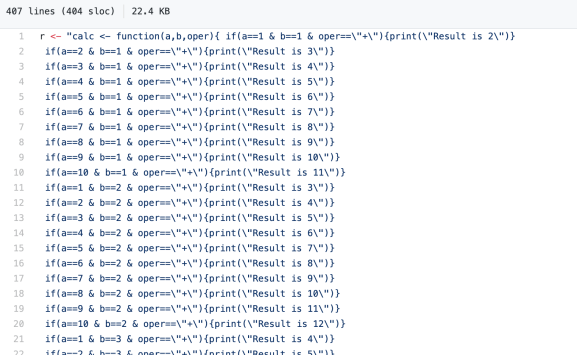Little useless-useful R functions – Script that generates calculator script
Want to share your content on R-bloggers? click here if you have a blog, or here if you don't.
This time the simple useless function will generate a long list of IF clauses that will in fact return the result of a mathematical operation between two numbers.

This is not by no means any type of automatic generation of code, not a script, that will write itself.
The concept is fairly simple. Create a function that will return the results of a mathematical operation: addition, multiplication, division, subtraction, for two positive integers (whole number). Between 1 and 10. That’s it 
# Basic concept
calc <- function(a,b,oper){
if(a==1 & b==1 & oper=="+"){print("Result is 2")}
if(a==1 & b==1 & oper=="-"){print("Result is 0")}
if(a==1 & b==1 & oper=="*"){print("Result is 1")}
if(a==1 & b==1 & oper=="/"){print("Result is 1")}
}
calc(1,1,"-")
calc(1,1,"+")
calc(1,1,"*")
calc(1,1,"/")
I have played a little bit with combinations of 4 operations, and two times 10 numbers, yielding 400 combinations. And the function that generates the final calculate function is the following:
# set all combinations
df <- data.frame(merge(merge(c(1:10), c(1:10), by=NULL), c("+","-","/","*"), by=NULL))
colnames(df) <- c("numberA", "numberB", "oper")
f <- "calc <- function(a,b,oper){"
for (i in 1:nrow(df)){
res <- paste0(as.character(df$numberA[i]) , df$oper[i], as.character(df$numberB[i]))
rr <- eval(parse(text=res))
f1 <- paste0(' if(a==',as.character(df$numberA[i]), ' & b==', as.character(df$numberB[i]), ' & oper==', '"',as.character(df$oper[i]),'"' ,
'){print("Result is ', as.character(rr),'")}', '\n\r' , collapse=NULL)
f <<- paste0(f, f1, collapse = NULL)
if(i==nrow(df)){
f <<- paste0(f, "}", collapse = NULL)
eval(parse(text=f))
}
}
calc(4,5,"/")
Once the calc function for all 400 combinations is created, feel free to use it.
For some comparison, let’s crunch some numbers. I wanted to see how long does it take if the function get’s longer. The code for measuring the execution time:
start.time <- Sys.time() calc(20,3,"+") end.time <- Sys.time() end.time - start.time
And the results for adding more positive integers is at least to say interesting, if not useless.
| Number of integers | Number of combinations | First Execution time (sec) | Average next execution time (sec) | Size of function |
| 10 | 400 | 5,6s | 0.0012 | 2.3Mb |
| 20 | 1600 | 11,5s | 0.0022 | 9.3Mb |
| 25 | 2500 | 28,4s | 0.0027 | 14.5Mb |
| 50 | 10000 | 717s | 0.0081 | 58Mb |
| 100 | 40000 | / | / | 232.1Mb |
Hitting first 100 positive integers, the function increased to 230 Mb, taking space in memory. And based on the exponential growth of the size of the function, my laptop would hit “out of memory” boundary by the integer 1000. This makes you appreciate he usefulness of CPU architecture 
As always, code is available on Github.
Happy R-Coding and stay healthy!
R-bloggers.com offers daily e-mail updates about R news and tutorials about learning R and many other topics. Click here if you're looking to post or find an R/data-science job.
Want to share your content on R-bloggers? click here if you have a blog, or here if you don't.
